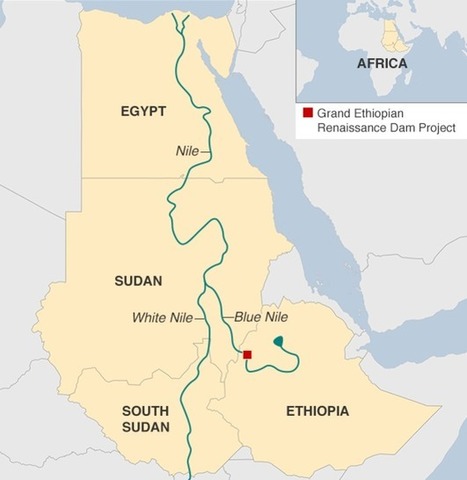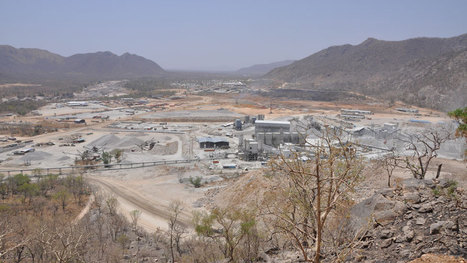Three African leaders sign an initial deal to end a long-running dispute over the sharing of Nile waters and the building of Africa's biggest hydroelectric dam.
Get Started for FREE
Sign up with Facebook Sign up with X
I don't have a Facebook or a X account
 Your new post is loading... Your new post is loading...
 Your new post is loading... Your new post is loading...
|

Albert Jordan's curator insight,
April 1, 2014 3:06 PM
In an area fraught with political instability, non state actors, and rebel groups all too willing to fight for power and the wealth that comes from it - it will be interesting to see how the conflicts shift over time as this dam gets closer to completion. Will Egypt attempt to sabotage it or will they take a more diplomatic approach and try to work with the Ethiopian government diplomatically again? Perhaps Egypt will whisper in to the ear of Sudan or the various "rebel" groups in the region, considering diplomatic means have apparently failed so far. With Sudan's use of the Blue River also going to be affected by Ethiopia's damming, it will be interesting to see if a cooperation between Egypt and Sudan occurs. Perhaps Ethiopia would like to see a deeper conflict between Sudan and South Sudan, keeping their affected neighbor off balance.
Tracy Galvin's curator insight,
April 16, 2014 6:47 PM
It is extremely difficult to divide a river. The Ethiopians will benefit immensely from this project but the Egyptians could lose everything if the Nile dries up. This is going to be a difficult problem to solve. 
Jess Deady's curator insight,
May 4, 2014 3:45 PM
There is no way the whole Nile river is going to be dried up because of this damn. Ethiopia won't let that happen. To say that the river is going to have the same amount of water in it, thats not going to happen. Obviously the Gerd is going to have a huge impact on the water supply of the Nile but it definitely isn't going to dry up the whole thing! |











This article discusses the dispute between Egypt and Ethiopia over the construction of a dam that would provide Ethiopia with a larger share of the Nile's water. Egypt is wholly opposed to this dam because it would mean less water for the country, which so desperately needs it. With 95% of the population of Egypt living within 20km of the Nile River, a reduction in the amount of water supplied to these tens of millions could potentially spell slow disaster. At the same time, however, Ethiopia desperately needs water from the Nile in order to provide sustainable energy for its citizens.
The Nile has been a source of life and energy for thousands of years in an oppressively hot, dry place. The ancient Egyptians counted on the Nile to flood every year so that they would have arable land and used the large river to irrigate their farmland. It is almost ironic, therefore, that Egyptians are once again counting on the water of the Nile to help them survive in such a harsh climate. It seems that the Nile is one of those natural geographic features that is pivotal to political, economic, and social wellbeing. It represents the nexus between natural landforms and the political and economic goals of human beings and nations. Dispute over use of the Nile as a natural and life-giving resource is not the first instance of human debate over possession or use of natural geography and it likely won't be the last.
85% of the Nile's water comes from the Blue Nile that originates in the Ethiopian highlands--it is the Blue Nile that Ethiopia has been working on damming since 2011. The Grand Ethiopia Renaissance Dam (GERD) will be located near the border with Sudan (see in Google Maps). Prior to this trilateral agreement, Egypt and Sudan received the majority of the Nile's waters because of outdated colonial-era treaties that ignored upstream riparian states. This explains why in the past, Egypt was so adamantly opposed to Ethiopia's plan fearing that their water supply with be threatened. Today though, the Egyptian President said, "We have chosen cooperation, and to trust one another for the sake of development."
Tags: Ethiopia, Africa, supranationalism, political, development, environment, water, energy, borders.